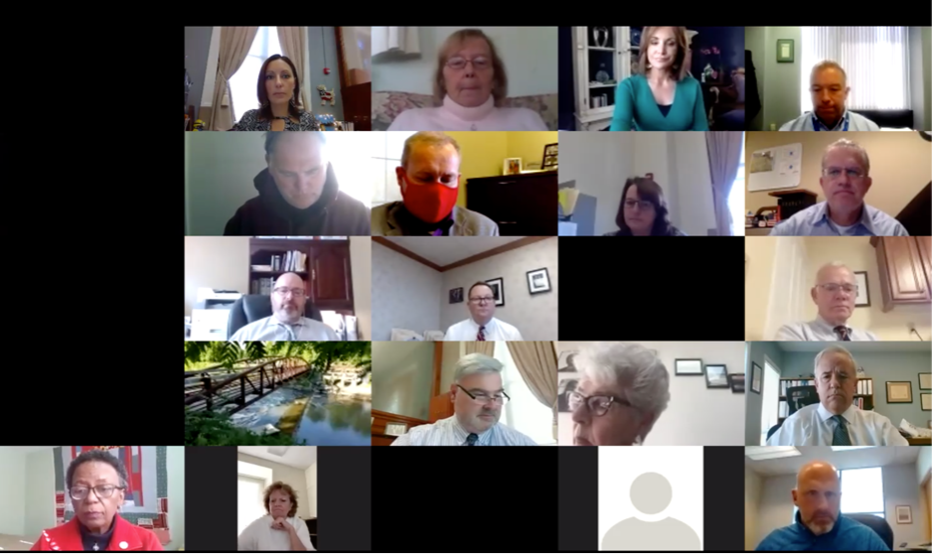Caseloads pile up as Onondaga County cuts child welfare staff
Cuts causing local child welfare caseloads to pile up

Three Onondaga County union reps who work in the Department of Children and Family Services are all sounding the same alarm: the department is overstretched.
In November of last year, the Commissioner for DCFS, Richard Gasiorowski, told the Onondaga County Legislature that his department would be able to deal with cuts to their workforce proposed in the 2021 budget.
Employees, including investigators who look into reports of child abuse and case workers who follow children through foster care, now say that that isn’t true.
“Everyone is doing the job of two people,” said Sara Fuller, a union representative who has worked for the department for eight years. “We are so close to something horrific happening to a child.”
Employees say that years of cuts in staffing in DCFS have resulted in a situation where an investigator may be tasked with investigating three to five child abuse reports per week. The state recommends investigators receive three. In the office of permanency, which handles long term child removals and foster care, case workers could be looking after 25 or more children, according to multiple employees in the department. The state recommends 12.
The 2021 county budget, which was approved by the legislature along party lines in December, includes a 19% cut in the already strained child welfare staffing. Simultaneously, the case workers say COVID-19 and the resulting quarantine have led to more severe cases of child neglect and abuse.
“We are drowning,” said Blair Banks, a supervising senior case worker for DCFS. “We need staffing desperately.”
Banks said that over her 14 years working for the department, she has witnessed the deterioration of employee morale. Burnout has led to a fast turnover of case workers, who often give up their evenings and weekends to work on cases without pay.
“This used to be a career that people would spend 25, 30 years in,” she said. “Now it’s becoming a temporary job.”
She said that burnout is multiplied by state mandates, which require certain actions to be taken quickly. Within 24 hours of a child abuse report, for example, investigators have to talk to everyone involved and determine child safety. Within seven days, all of the people involved must be formally interviewed. If investigators miss these benchmarks, they are punished.
“There is no possible way to get the work done,” said Jen Caiella, a union officer who works for the county. “This is about children’s safety. This about children’s lives.”
Caiella said that worker morale is “horrendous,” and the department has been understaffed for years. This year was a hard blow to an already fragile workforce, she said.
The 19% cut in child welfare staffing for the 2021 budgetary year comes off a 6% cut to the total county budget. County Executive Ryan McMahon called these cuts “unprecedented” and “draconian” at his budget presentation in early November.
Many counties in New York are facing cuts this year. Counties get the bulk of their revenue from sales tax, which was depressed during the COVID-19 shutdown that left many businesses shuttered. But Monroe county, which includes Rochester, is increasing their 2021 budget by 0.4% compared to 2020.
Onondaga County has to suffer these cuts in part because they did not receive federal funding as part of the CARES Act last March. With just over 460,000 residents, the county missed the population benchmark of 500,000 people set by the federal government. So, they did not receive any federal aid. Monroe county, with 700,000 residents, was eligible to receive $9 million in federal funding this November.
But Democratic Onondaga County legislators still thought it was important to hire more employees at DCFS for 2021.

Peggy Chase, a Democrat legislator representing district nine, proposed an amendment to the budget in December, calling for 10 new employees for DCFS and 10 new employees for the department of social services, which handles food stamps and Medicare disbursements. The move would have cost just over $1.2 million, and Chase was proposing taking that money from the fund balance, a $77 million fund reserved for fiscal emergencies.
“They say this fund is for a rainy day,” said Chase at the budget meeting last Thursday. “Well, it’s pouring out there.”
The new hire amendment was rejected by Republicans, who control the legislature. Legislator Julie Abbott-Kenan, the Republican chairperson for the Health and Human Services Committee, said in the meeting that she could not support the amendment despite her concerns for county employees and the children they work with.
The Republican Chairman of the Legislature David Knapp argued that the county would already be using more than $20 million of the fund balance to settle the deficit caused this year, and they could not afford to take more with the uncertain future.
Brian May, the Republican legislator from district one and the majority leader, said that it is an unfortunate situation, but there were few options left to the legislators.
“There is no choice but to do more with less,” he said. “But of course, we are worried about our employees.”
May said that DCFS is going to get creative, and that he has faith that the county employees will be able to continue to provide the services they always have.
Even 10 new employees would not have been nearly enough to offset the shortages though, according to the supervisors and case worker at DCFS. The budget cuts 43 positions compared to last year.
Fuller said she works through her lunch every day to get ahead on the case load. She estimates she works seven hours unpaid every week to make sure that services are provided to families. She has even known colleagues to work on their days off.
“That is just a drop in the bucket compared to how much work needs to get done,” Fuller said.
Overworked and tired, many of Fuller’s colleagues are looking for new jobs she said. The workforce may shrink even more because of turnover Fuller warned.
Fuller estimated that the department would need 30 to 40 more employees to meet the demand on the system. Without that, Fuller fears that the office will miss an early warning sign or fail a child in need.
“I am personally fearful for the children,” she said. “And I feel bad for the families in the system.”
Tammy Honeywell, the Vice President of the Onondaga County Chapter of the Civil Service Employees Association, is concerned about the department’s workers. During the early months of the pandemic, DCFS was classified an essential service, so employees had to carry on the same work as the world confronted drastic changes and children could no longer go to school. At the same time, the county’s workforce was being reduced with layoffs and early retirement.
“They were deemed essential, but treated as expendable,” said Honeywell.
Honeywell added that she knows that county employees are overworked and exhausted. Services are left undelivered and the work doesn’t get done says Honeywell.
So, when Honeywell saw that Commissioner Gasiorowski said they would be alright, she was confused.
Blair Banks does not agree with the commissioner’s assessment either.
“We cannot provide the true, in-depth services that we would with more staff,” said Banks. “We don’t have the manpower to be proactive.”
Banks said she is troubled as the timelines for child abuse cases grow longer and kids are separated from their families for longer periods of time. With more staff, kids could go home sooner, she said.
Banks said that these concerns have been long ignored by her bosses, who did not ask for more staff during the budget hearings that happened last month. After multiple emails and phone calls, the County Executive’s office did not provide an on the record comment. During his budget presentation he said that they would have to get creative and that they would find ways to deal with a smaller staff.
“The idea that we are going to continue as normal is wholeheartedly inaccurate,” said Banks. “I am only one person. We need more bodies.”





